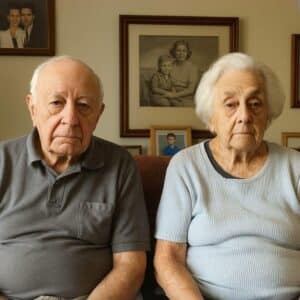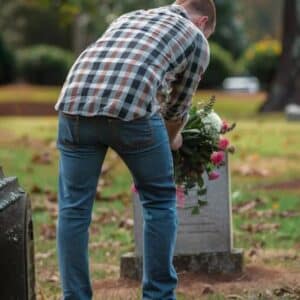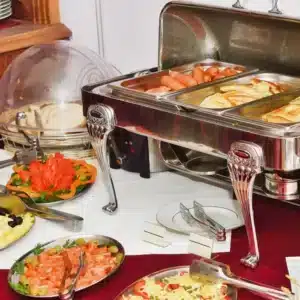Some people grow up wrapped in the warmth of bedtime stories, steaming dinners, and bicycle rides at sunset. My childhood wasn’t one of those stories—unless you count the kind where the hero is forgotten in the background.
That changed when Grandma Grace stepped in.
She didn’t ask. She didn’t negotiate. One afternoon, she looked at me—this skinny, awkward kid standing beside a mother who chased men and chaos like they were hobbies—and said, “Tom, you’re coming with me.”
And I did. I went home.
With her, I learned what love looked like in peanut butter sandwiches, school recital applause, and quiet, unshakable presence. She didn’t need to shout to command a room. She made space just by being in it.
So when she died, I grieved like I was six again. At twenty-six, I felt lost in a world that never quite fit me—except when she was in it.
The will was read in a stuffy office that smelled like old receipts and burnt coffee. My mother, Delia, perched in her chair like royalty inspecting her inheritance. Cynthia, my sister, flipped through her phone like she had better places to be.
I, on the other hand, watched the door like maybe—just maybe—Grace would walk in and tell us all it was a misunderstanding.
But she didn’t.
“The house,” the notary said, clearing his throat, “goes to Delia.”
My mother nodded smugly.
“The car goes to Cynthia.”
“Finally,” my sister muttered, already planning to flip it for cash.
“And to Thomas…”
There was a pause. Then, a single envelope.
Cynthia snorted. “What’s it say—‘Better luck next time’?”
Inside was a photo. One I remembered. Me and Gran at the zoo, my grin crooked, her eyes full of that joyful squint only she had.
A short note:
For you, Tom. Our photo. The zoo. Love you always, Grandma G.
That was it. No check. No deed. No key. Just a picture and a sinking feeling that I had been forgotten.
But Grace never played her hand all at once.
The next day, I returned to the house. Delia was already tossing bird figurines in donation bins, barking orders at a moving crew.
I walked quietly past her to the hallway where the zoo photo still hung. I took it down, ignoring her loud laugh behind me.
“You always were sentimental garbage,” she said. “You’d think you’d grow out of that.”
Back at my apartment, I set the picture on my desk. The old frame had a small crack and a paper backing warped with age. I took it apart gently, wanting to place it in the new wooden frame Marla from work had gifted me “for something special.”
That’s when I felt something stiff behind the photo’s matting.
Taped inside the frame was another envelope.
My heart skipped.
Inside: original stock certificates, a key to a safety deposit box, and a note:
True treasure doesn’t make noise. Love, Grandma G.
The next morning, I quit my job. No fanfare. Just dropped my badge in the drawer, said nothing to Steve—who still called me “Travis” after a year—and walked out.
At the bank, the key slipped into the safety deposit box like it belonged. Inside were deeds to five rental properties, fully paid off and earning income. A large stock portfolio. And a single slip: another deed—this time to the land beneath the house Grace had left to my mother.
She gave my mother the shell.
But I owned the foundation.
When I called to tell her, Delia lost it.
“You can’t do this!”
“You live in my house, Mom,” I replied calmly. “But I own the dirt under your feet.”
It was a slow burn from there. I bought the house from her—cheap, fair, fast—just enough for her to scrape by and clean up one of Cynthia’s disasters. But I didn’t move in.
I turned the house into a sanctuary.
We called it The Corner of Grace.
Not a shelter. Not quite a café. Just a warm space where anyone could feel safe. Where pie was served like medicine, where tea came with silence or stories—your choice. Where second helpings weren’t questioned, and no one left with an empty belly or a heavy heart.
Old friends came back. Neighbors sent flowers. A barber offered free haircuts on Thursdays. Marla brought over kids’ books. Someone donated yarn. Someone else baked cookies. And slowly, Grace’s spirit wove itself into every corner of the home she once ruled so quietly.
I framed that zoo picture and hung it by the front door.
And one day, Cynthia came.
Her sharpness was still there, but her shine had faded.
“Rhett’s gone,” she said. “He took everything. I have nowhere.”
“I don’t have money,” I said. “But you can stay. If you work. Help. Be someone Grace would have been proud of.”
She hesitated. Then nodded.
“I don’t know how to be that person,” she whispered.
“You can learn,” I said. “I did. Grace taught me.”
And in the house she made a home, in the echo of her laugh and the warmth of her spirit, people like us—forgotten, bruised, lost—find ourselves again.
Grace didn’t leave me nothing.
She left me a mission.





